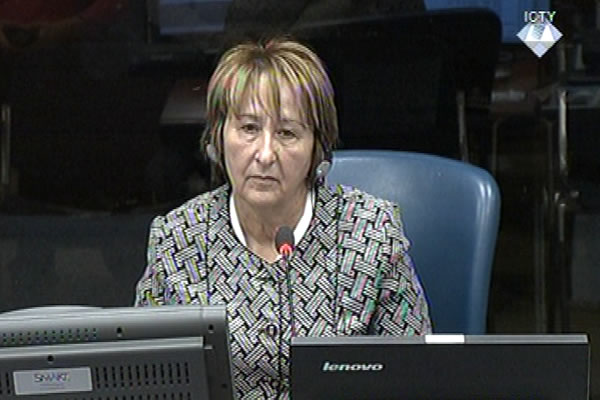Home
WHY AND WHEN DID MUSLIMS LEAVE PRIJEDOR?
Zdravka Karlica, the president of the organization of Serb victims of war from Prijedor, gave evidence in Ratko Mladic’s defense. Karlica admitted that crimes had been perpetrated against non-Serb civilians. However, according to Karlica, not all villages were attacked and most of the Muslims fled the town before the conflict broke out
 Zdravka Karlica, defence witness at Rako Mladic trial
Zdravka Karlica, defence witness at Rako Mladic trial After a one-month break, Ratko Mladic’s defense continues its case with the evidence of Zdravka Karlica. The witness is the president of the Organization of the Families of Killed Fighters and Missing Civilians in the Prijedor municipality. The organization, as Karlica explained, deals only with Serb victims. In her statement to the defense, the witness mostly presented hear-say evidence, things that she had learned from her late husband or his fellow fighters from the Prijedor Brigade.
The witness’s husband Zoran Karlica took part in the negotiations that resulted in the Muslims in Kozarac surrendering their arms in May 1992. As the witness said, her husband told her that an agreement had been negotiated. Some days later, Muslim extremists decided not to lay down their arms and on 24 May 1992, they attacked the Serb military column. As a result of the ensuing conflict Muslim refugees from Kozarac started arriving in the town.The witness’s husband took part in the fighting in the village of Hambarine on 22 May 1992 as well as in the defense of the Serb municipality of Prijedor against an attack led by a Croat, Slavko Ecimovic, on 30 May 1992. Zoran Karlica was wounded in the attack and passed away a week later in hospital in Belgrade. Zoran Karlica was posthumously decorated and a square in Prijedor was named after him.
Prosecutor Amir Zec noted in the cross-examination that before the war that square bore Lenin’s name. Many other streets were renamed after 1995 and were given names of Serb heroes from the last war and from earlier history, the prosecutor said. The witness didn’t contest the claim but the presiding judge Orie reacted to it. ‘Since the beginning of the testimony we have heard a lot of irrelevant evidence. Now it happens in the cross-examination, and the Trial Chamber doesn’t encourage it’, the presiding judge explained, calling into question the relevance of the evidence on the streets being renamed.
The relevant parts of the witness’s evidence pertained to the departure of the non-Serbs from Prijedor. Today in court, the witness confirmed the claim she had made in her written statement:most of the Muslims left the town before the conflict. Nobody touched non-Serbs in the villages where there were no attacks on Serb units, the villages of Cela and Puharska being cases in point, the witness argued. In those villages, non-Serbs were able to stay and to live peacefully until the end of the war. According to the witness, the exodus of civilians from those two villages started in the summer of 1995, when Serb refugees from Krajina arrived in the Prijedor territory‘in search of a place to stay’.
Judge Orie asked if Muslim and Croat civilians were killed in the villages where there were attacks. The witness replied that at a meeting with the victims’ representatives she learned that 256 Muslim women and 10 girls were killed in Prijedor. That ‘came as a shock’ to the witness. Last year when the arrests of those who committed the crime in the village of Zecovi began, she learned that Muslim women and children had been killed there, Karlica explained. The witness admitted that she knew about non-Serb civilians being detained in the Prijedor prison camps in Keraterm, Omarska and Trnopolje. In the cross-examination, the prosecutor stressed that in the village of Puharska the non-Serbs were attacked while the mosque and Catholic church were razed to the ground. The witness didn’t know anything about that.
After Zdravka Karlica completed her testimony, the defense called Rajko Kalabic. During the war Kalabic was a member of the Crisis Staff in the Kljuc municipality.
Linked Reports
- Case : Mladic
- 2014-12-18 HEAD OF MLADIC’S INFORMATION SERVICE CLAIMS HE DID NOT RECEIVE INFORMATION
- 2014-12-17 THIN LINE IN MLADIC WITNESS'S HEART
- 2014-12-17 NEW WITNESS, OLD CLAIMS
- 2015-01-20 WAR CRIMES COMMITTED BY 'OUT OF CONTROL INDIVIDUALS'
- 2015-01-22 ‘NO ONE TOUCHED MUSLIMS IN KLJUC’
- 2015-01-23 ‘PROTECTION’ OF MUSLIMS IN KLJUC
